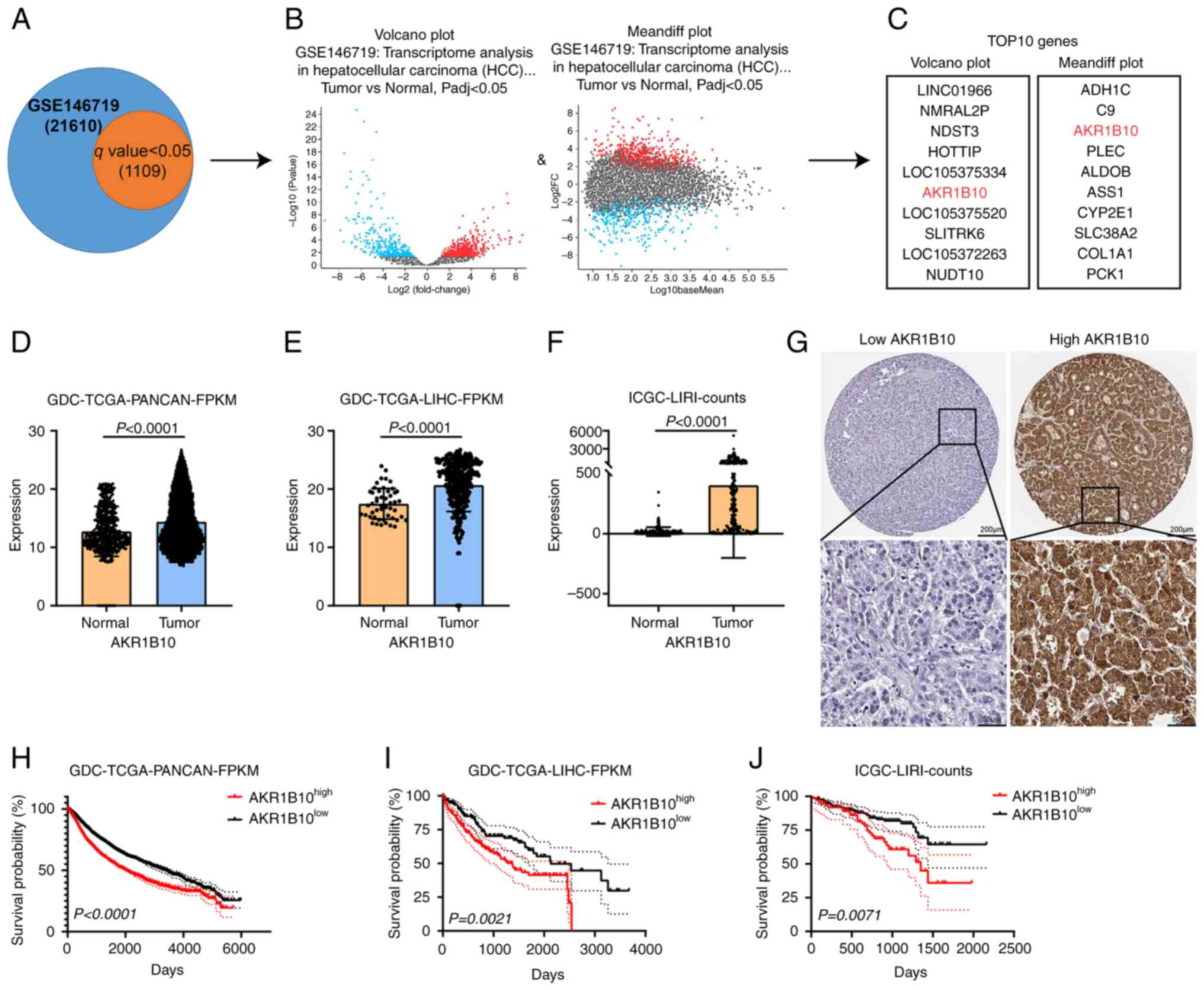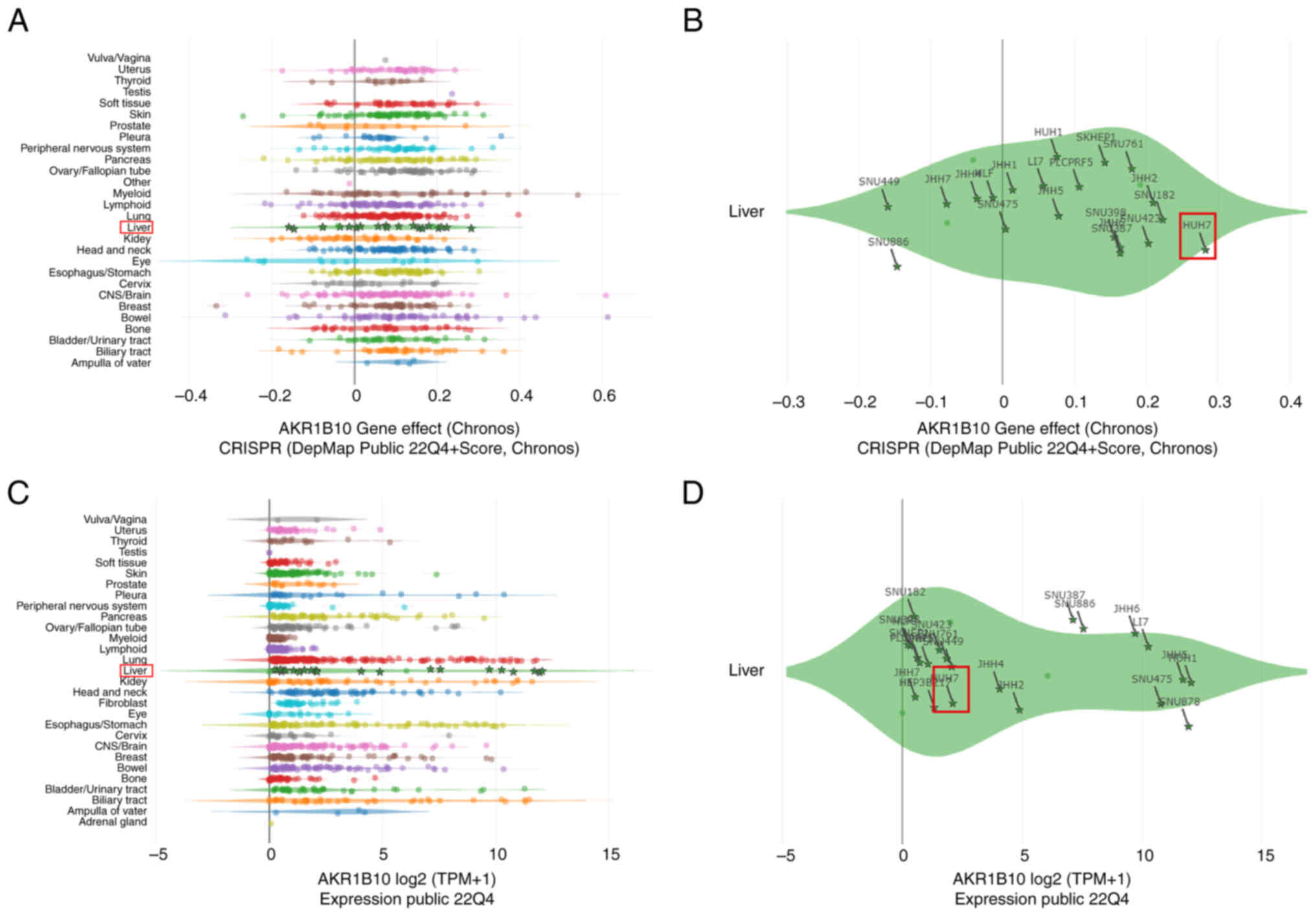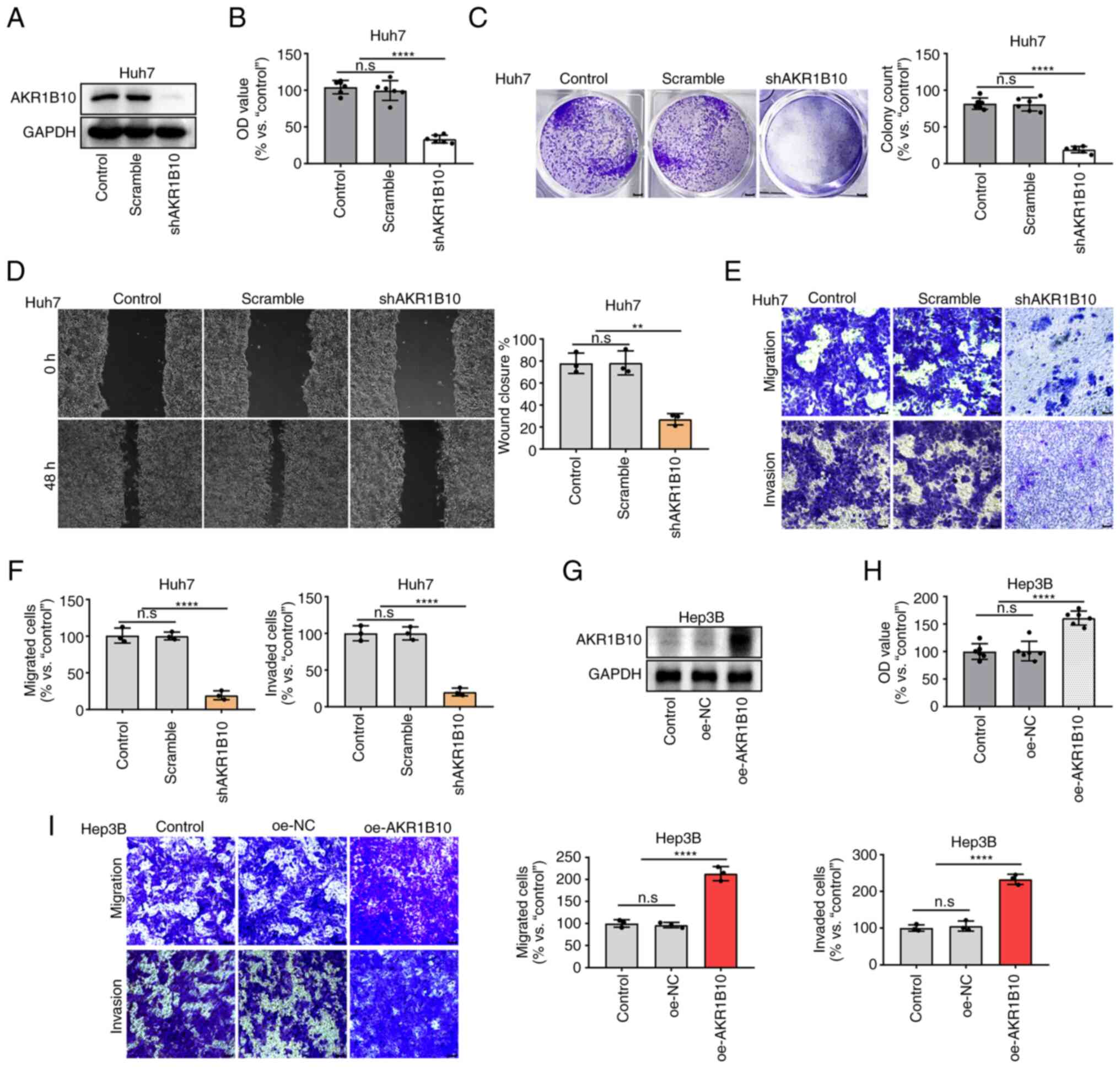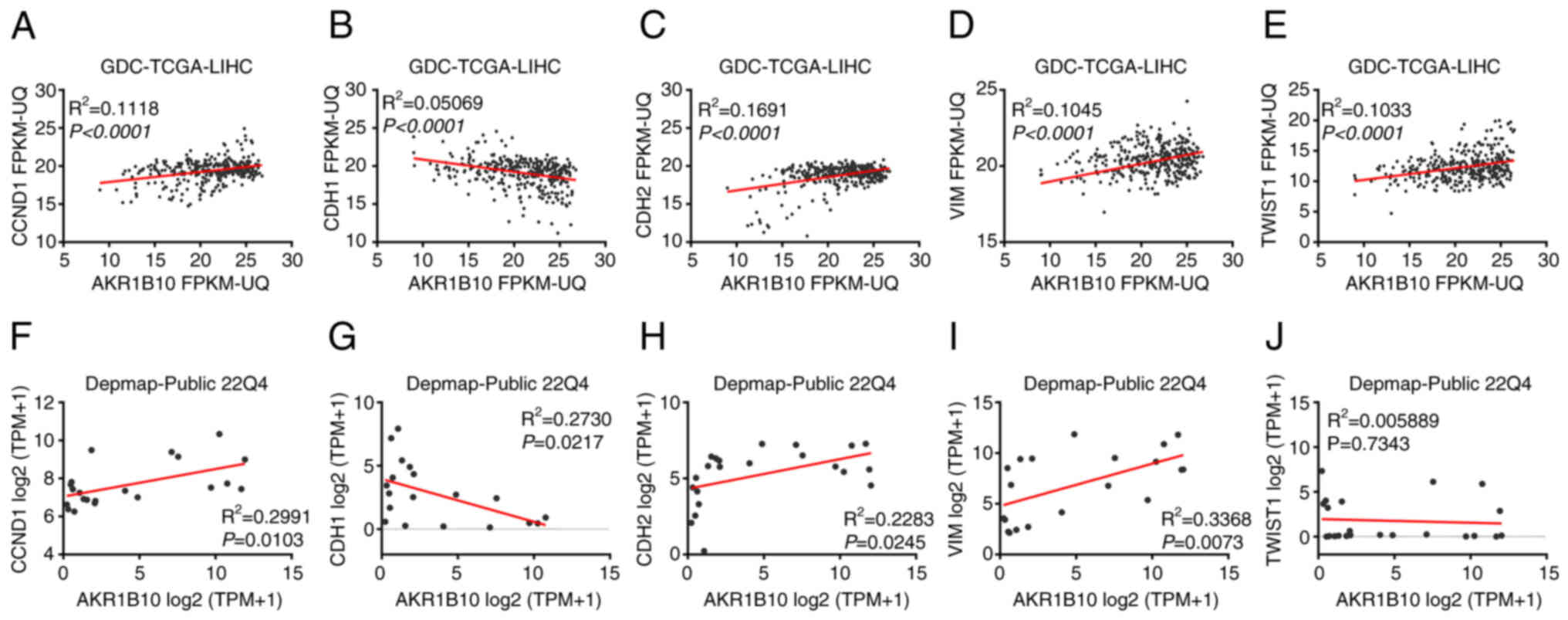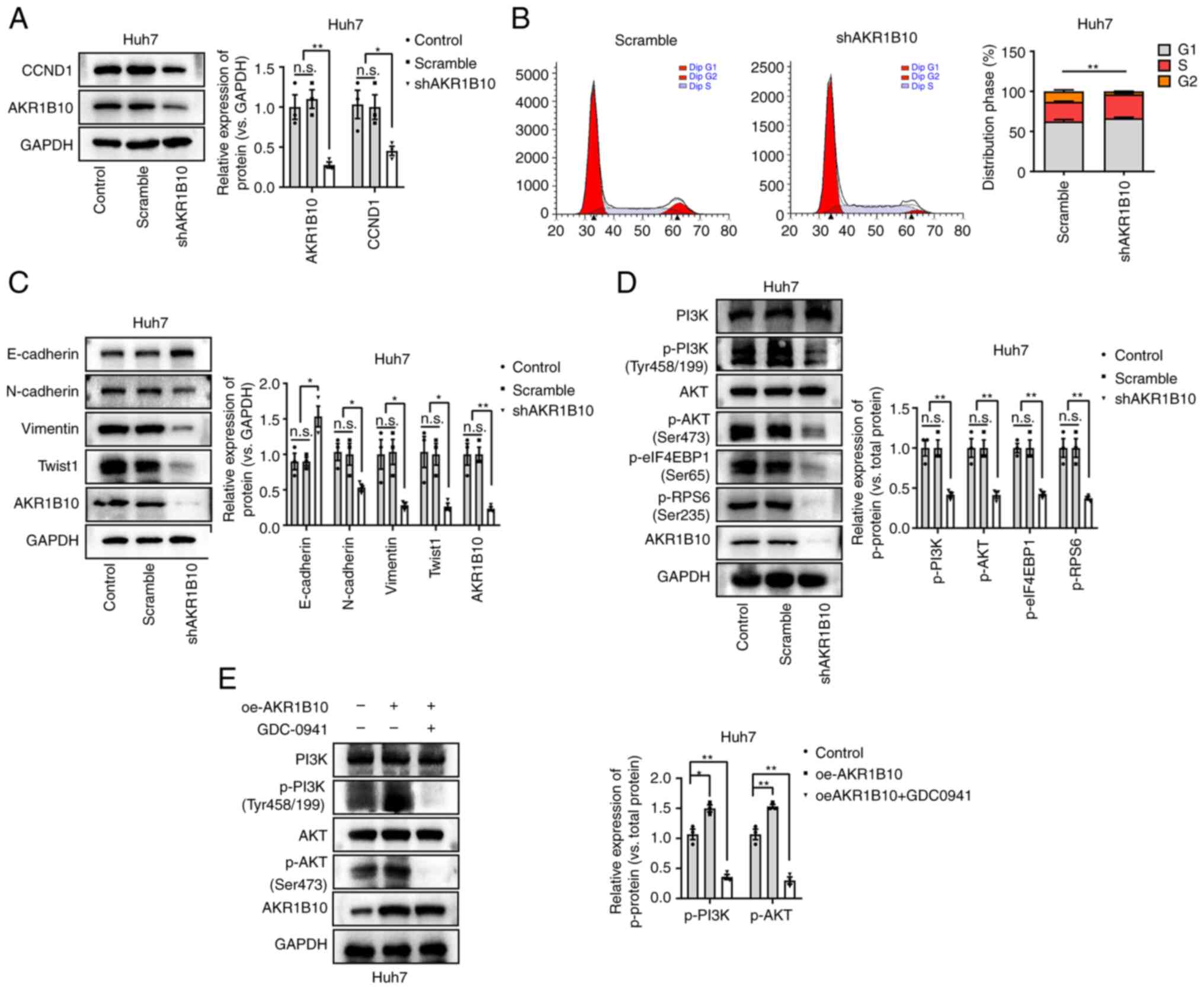|
1
|
Ladd AD, Duarte S, Sahin I and Zarrinpar
A: Mechanisms of drug resistance in HCC. Hepatology. Jan
3–2023.(Epub ahead of print). View Article : Google Scholar : PubMed/NCBI
|
|
2
|
Wang Z, Pei Y, Li W, Zhang J and Liu J:
Clinical value of AKR1B10 in hepatocellular carcinoma: A systematic
review and meta-analysis. PLoS One. 17:e02795912022. View Article : Google Scholar : PubMed/NCBI
|
|
3
|
Siegel RL, Miller KD, Wagle NS and Jemal
A: Cancer statistics, 2023. CA Cancer J Clin. 73:17–48. 2023.
View Article : Google Scholar : PubMed/NCBI
|
|
4
|
Yu M, Chen Z, Zhou Q, Zhang B, Huang J,
Jin L, Zhou B, Liu S, Yan J, Li X, et al: PARG inhibition limits
HCC progression and potentiates the efficacy of immune checkpoint
therapy. J Hepatol. 77:140–151. 2022. View Article : Google Scholar : PubMed/NCBI
|
|
5
|
Erstad DJ and Tanabe KK: Hepatocellular
carcinoma: Early-stage management challenges. J Hepatocell
Carcinoma. 4:81–92. 2017. View Article : Google Scholar : PubMed/NCBI
|
|
6
|
Yang MY, Hung TW, Wang CJ and Tseng TH:
Inhibitory Effect of Nelumbo nucifera Leaf extract on
2-acetylaminofluorene-induced hepatocarcinogenesis through
enhancing antioxidative potential and alleviating inflammation in
rats. Antioxidants (Basel). 8:3292019. View Article : Google Scholar : PubMed/NCBI
|
|
7
|
Huang H, Tsui YM and Ng IO: Fueling HCC
dynamics: Interplay between tumor microenvironment and tumor
initiating cells. Cell Mol Gastroenterol Hepatol. 15:1105–1116.
2023. View Article : Google Scholar : PubMed/NCBI
|
|
8
|
Cicinnati VR, Sotiropoulos GC and
Beckebaum S: Established and emerging therapies for hepatocellular
carcinoma. Minerva Med. 101:405–418. 2010.PubMed/NCBI
|
|
9
|
DiStefano JK and Davis B: Diagnostic and
prognostic potential of AKR1B10 in human hepatocellular carcinoma.
Cancers (Basel). 11:4862019. View Article : Google Scholar : PubMed/NCBI
|
|
10
|
Chen D, Huang R, Ren F, Wang H, Wang C and
Zhang Y: FNDC5 and AKR1B10 inhibit the proliferation and metastasis
of adrenocortical carcinoma cells by regulating AMPK/mTOR pathway.
Exp Ther Med. 25:1362023. View Article : Google Scholar : PubMed/NCBI
|
|
11
|
Qu J, Li J, Zhang Y, He R, Liu X, Gong K,
Duan L, Luo W, Hu Z, Wang G, et al: AKR1B10 promotes breast cancer
cell proliferation and migration via the PI3K/AKT/NF-κB signaling
pathway. Cell Biosci. 11:1632021. View Article : Google Scholar : PubMed/NCBI
|
|
12
|
Liu C, Shi L, Li W, Huang Z, Wang S, Xu P,
Li T, Li Z, Luo F, Li W, et al: AKR1B10 accelerates the production
of proinflammatory cytokines via the NF-κB signaling pathway in
colon cancer. J Mol Histol. 53:781–791. 2022. View Article : Google Scholar : PubMed/NCBI
|
|
13
|
Ye X, Li C, Zu X, Lin M, Liu Q, Liu J, Xu
G, Chen Z, Xu Y, Liu L, et al: A large-scale multicenter study
validates aldo-keto reductase family 1 member B10 as a prevalent
serum marker for detection of hepatocellular carcinoma. Hepatology.
69:2489–2501. 2019. View Article : Google Scholar : PubMed/NCBI
|
|
14
|
Xie C, Ye X, Zeng L, Zeng X and Cao D:
Serum AKR1B10 as an indicator of unfavorable survival of
hepatocellular carcinoma. J Gastroenterol. 58:1030–1042. 2023.
View Article : Google Scholar : PubMed/NCBI
|
|
15
|
Xu B, Wang F, Song C, Sun Z, Cheng K, Tan
Y, Wang H and Zou H: Large-scale proteome quantification of
hepatocellular carcinoma tissues by a three-dimensional liquid
chromatography strategy integrated with sample preparation. J
Proteome Res. 13:3645–3654. 2014. View Article : Google Scholar : PubMed/NCBI
|
|
16
|
Kim SY, Shen Q, Son K, Kim HS, Yang HD, Na
MJ, Shin E, Yu S, Kang K, You JS, et al: SMARCA4 oncogenic
potential via IRAK1 enhancer to activate Gankyrin and AKR1B10 in
liver cancer. Oncogene. 40:4652–4662. 2021. View Article : Google Scholar : PubMed/NCBI
|
|
17
|
Zhang J, Zhang X, Li J and Song Z:
Systematic analysis of the ABC transporter family in hepatocellular
carcinoma reveals the importance of ABCB6 in regulating
ferroptosis. Life Sci. 257:1181312020. View Article : Google Scholar : PubMed/NCBI
|
|
18
|
Yang Z, Xu T, Xie T, Yang L, Wang G, Gao
Y, Xi G and Zhang X: CDC42EP3 promotes glioma progression via
regulation of CCND1. Cell Death Dis. 13:2902022. View Article : Google Scholar : PubMed/NCBI
|
|
19
|
Leontieva OV, Demidenko ZN and
Blagosklonny MV: MEK drives cyclin D1 hyperelevation during
geroconversion. Cell Death Differ. 20:1241–1249. 2013. View Article : Google Scholar : PubMed/NCBI
|
|
20
|
Siegel RL, Miller KD, Fuchs HE and Jemal
A: Cancer statistics, 2021. CA Cancer J Clin. 71:7–33. 2021.
View Article : Google Scholar : PubMed/NCBI
|
|
21
|
Zhang T, Guan G, Zhang J, Zheng H, Li D,
Wang W, Lu F and Chen X: E2F1-mediated AUF1 upregulation promotes
HCC development and enhances drug resistance via stabilization of
AKR1B10. Cancer Sci. 113:1154–1167. 2022. View Article : Google Scholar : PubMed/NCBI
|
|
22
|
Romero D: Combination set to transform HCC
therapy. Nat Rev Clin Oncol. 17:3892020. View Article : Google Scholar : PubMed/NCBI
|
|
23
|
Kim B, Lee HJ, Choi HY, Shin Y, Nam S, Seo
G, Son DS, Jo J, Kim J, Lee J, et al: Clinical validity of the lung
cancer biomarkers identified by bioinformatics analysis of public
expression data. Oncotarget. 67:7431–7438. 2007.
|
|
24
|
Zhu D, Nie Y, Zhao Y, Chen X, Yang Z and
Yang Y: RNF152 suppresses fatty acid oxidation and metastasis of
lung adenocarcinoma by inhibiting IRAK1-Mediated AKR1B10
expression. Am J Pathol. 193:1603–1617. 2023. View Article : Google Scholar : PubMed/NCBI
|
|
25
|
Zheng L, Zhang X, Pan X, Huang Z, Zhang M,
Xian J, Wei Y, Nie L, Zhang M, Gong J, et al: AKR1B10 is a new
sensitive and specific marker for fumarate hydratase-deficient
renal cell carcinoma. Mod Pathol. 36:1003032023. View Article : Google Scholar : PubMed/NCBI
|
|
26
|
Hojnik M, Šuster NK, Smrkolj Š, Sisinger
D, Grazio SF, Verdenik I and Rižner TL: AKR1B1 as a prognostic
biomarker of high-grade serous ovarian cancer. Cancers (Basel).
14:8092022. View Article : Google Scholar : PubMed/NCBI
|
|
27
|
Huang Z, Yan Y, Zhu Z, Liu J, He X,
Dalangood S, Li M, Tan M, Cai J, Tang P, et al: CBX7 suppresses
urinary bladder cancer progression via modulating AKR1B10-ERK
signaling. Cell Death Dis. 12:5372021. View Article : Google Scholar : PubMed/NCBI
|
|
28
|
Shao X, Wu J, Yu S, Zhou Y and Zhou C:
AKR1B10 inhibits the proliferation and migration of gastric cancer
via regulating epithelial-mesenchymal transition. Aging (Albany
NY). 13:22298–22314. 2021. View Article : Google Scholar : PubMed/NCBI
|
|
29
|
Yao Y, Wang X, Zhou D, Li H, Qian H, Zhang
J, Jiang L, Wang B, Lin Q and Zhu X: Loss of AKR1B10 promotes
colorectal cancer cells proliferation and migration via regulating
FGF1-dependent pathway. Aging (Albany NY). 12:13059–13075. 2020.
View Article : Google Scholar : PubMed/NCBI
|
|
30
|
He Y, Sun MM, Zhang GG, Yang J, Chen KS,
Xu WW and Li B: Targeting PI3K/Akt signal transduction for cancer
therapy. Signal Transduct Target Ther. 6:4252021. View Article : Google Scholar : PubMed/NCBI
|
|
31
|
Yang J, Nie J, Ma X, Wei Y, Peng Y and Wei
X: Targeting PI3K in cancer: Mechanisms and advances in clinical
trials. Mol Cancer. 18:262019. View Article : Google Scholar : PubMed/NCBI
|
|
32
|
Wang C, Yang Z, Xu E, Shen X, Wang X, Li
Z, Yu H, Chen K, Hu Q, Xia X, et al: Apolipoprotein C-II induces
EMT to promote gastric cancer peritoneal metastasis via
PI3K/AKT/mTOR pathway. Clin Transl Med. 11:e5222021. View Article : Google Scholar : PubMed/NCBI
|
|
33
|
Wang Y, Li Y, Wang L, Chen B, Zhu M, Ma C,
Mu C, Tao A, Li S, Luo L, et al: Cinnamaldehyde suppressed
EGF-Induced EMT process and inhibits ovarian cancer progression
through PI3K/AKT pathway. Front Pharmacol. 13:7796082022.
View Article : Google Scholar : PubMed/NCBI
|
|
34
|
Dian MJ, Li J, Zhang XL, Li ZJ, Zhou Y,
Zhou W, Zhong QL, Pang WQ, Lin XL, Liu T, et al: MST4 negatively
regulates the EMT, invasion and metastasis of HCC cells by
inactivating PI3K/AKT/Snail1 axis. J Cancer. 12:4463–4477. 2021.
View Article : Google Scholar : PubMed/NCBI
|
|
35
|
Huang C, Cao Z, Ma J, Shen Y, Bu Y,
Khoshaba R, Shi G, Huang D, Liao DF, Ji H, et al: AKR1B10 activates
diacylglycerol (DAG) second messenger in breast cancer cells. Mol
Carcinog. 57:1300–1310. 2018. View Article : Google Scholar : PubMed/NCBI
|
|
36
|
Manning BD and Toker A: AKT/PKB signaling:
Navigating the network. Cell. 169:381–405. 2017. View Article : Google Scholar : PubMed/NCBI
|
|
37
|
Wu T, Ke Y, Tang H, Liao C, Li J and Wang
L: Fidarestat induces glycolysis of NK cells through decreasing
AKR1B10 expression to inhibit hepatocellular carcinoma. Mol Ther
Oncolytics. 23:420–431. 2021. View Article : Google Scholar : PubMed/NCBI
|















